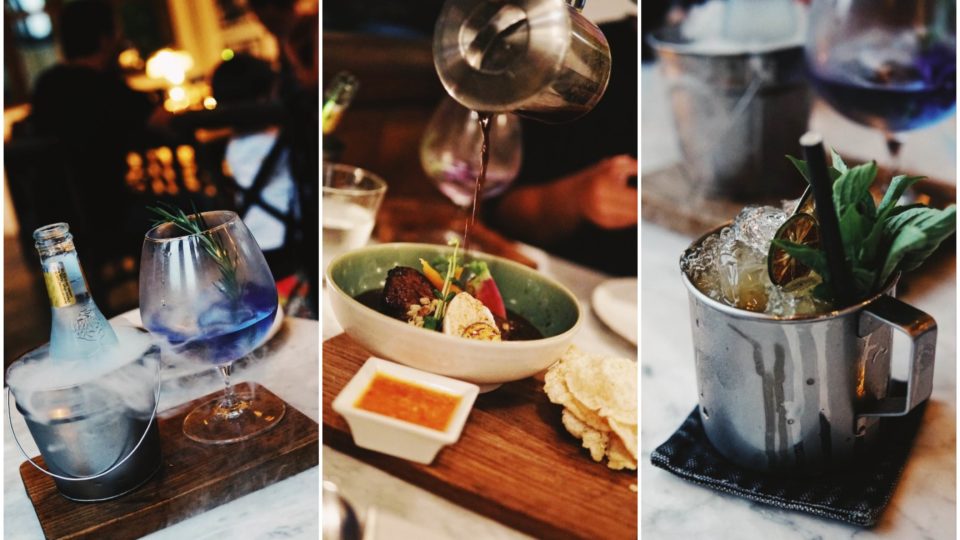The “Indonesian-oriented” restaurant of regional celeb chef Will Meyrick, Hujan Locale up in Ubud, is known for hand-picking and sourcing local ingredients to make home-cooked classics from across the archipelago like rendang, sop buntut (oxtail soup), and satay. It’s a Bali farm-to-table concept on an island where most restaurants of this philosophy serve a more Western or fusion menu. We respect what it’s about.
Fun fact: also going along with the whole local concept, the restaurant’s name, Hujan (rain in Indonesian), is about freshness (both in terms of flavors and ingredients) and they do their own smoking and curing.
Having opened up in December 2014 on Jl. Sriwedari, a more quiet street directly off the main, hectic thoroughfare, Jl. Raya Ubud, Hujan Locale’s no newcomer to the Ubud neighborhood. It was met with a ton of fanfare upon its launch, in large part because of that Asian-street-chef Meyrick name.
However, we have noticed many a blogger and reviewer saying it doesn’t live up to Meyrick’s OG Bali restaurant, Sarong. While we can’t speak on that comparison specifically, having never been to Sarong ourselves, we did go to Hujan Locale in 2016 and the salt grilled whole fish with sambal matah was bomb and has lived on in our memory as a meal to remember.
View this post on Instagram
But now, pretty much exactly five years after it first opened, how’s Hujan doing? Is it still a place we should recommend to our friends (because we have been recommending it to Ubud-bound friends after that salt fish. Our important question: Should we still be?). A PR-invite to come review the place seemed like a good opportunity to find out.
During our visit on a recent Saturday night, it was busy upstairs, in the more casual dining area of the restaurant — downstairs was looking a lot more quiet, though it’s set up as a more snazzy lounge (with plush velvet furniture) that offers tapas, so perhaps we were just in before things picked up down there.
The dining room has a French-colonial vibe with worn-wooden beams, faded green tiles, white walls, large framed black & white photographs, and a long panel of windows that give you that Ubud-jungle freshness —thankfully those can be closed if it’s pouring buckets like it did when we were there. It all feels a little more Vietnamese than Indonesian, but it’s a nice space nonetheless.
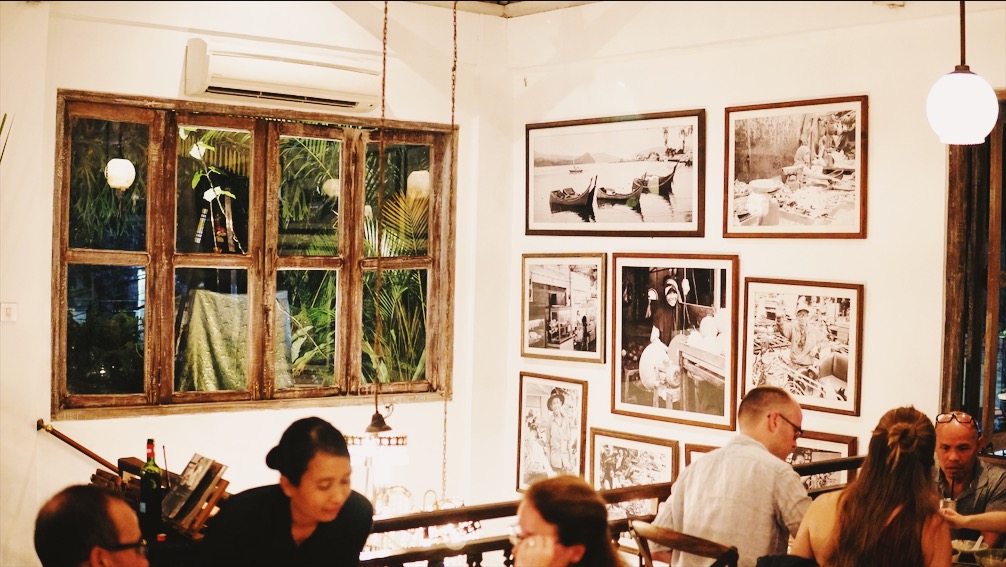
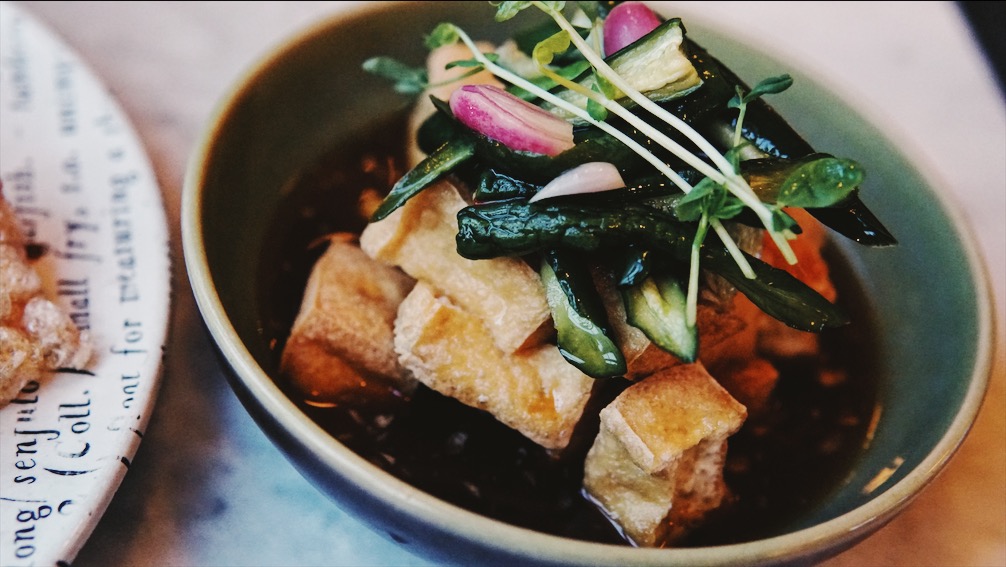
Things got off to a strong start with the Tahu Gejrot Cirebon (IDR55k/US$3.90) from the vegetarian menu. It’s a tofu dish in a sweet, tangy sauce with garlic, shallots, chili, palm sugar, and tamarind, along with some pickled cucumber.
The complimentary rempyek kacang (essentially, crispy Indonesian rice flour cracker with peanuts) served with sambal hijau (green chili condiment) was better than the typical free nibbler plate that restaurants give out (we usually leave those unfinished).
Next up was the Siobak Singaraja (IDR110k/US$7.80), the famous pork belly, apparently cured over three days, which we had high hopes for — not only as pork belly fanatics, but also because we’ve seen a number of rave posts in our feed feed about this babi. But, don’t believe everything you see on Instagram.
The portion was big, but… It was neither crispy nor fatty, a little too tough, making us think that perhaps the heat was a little too high on this slab of meat? We slathered it up thick with the sambal from the rempyek, but alas — it just didn’t do much for us. Thank u, next.
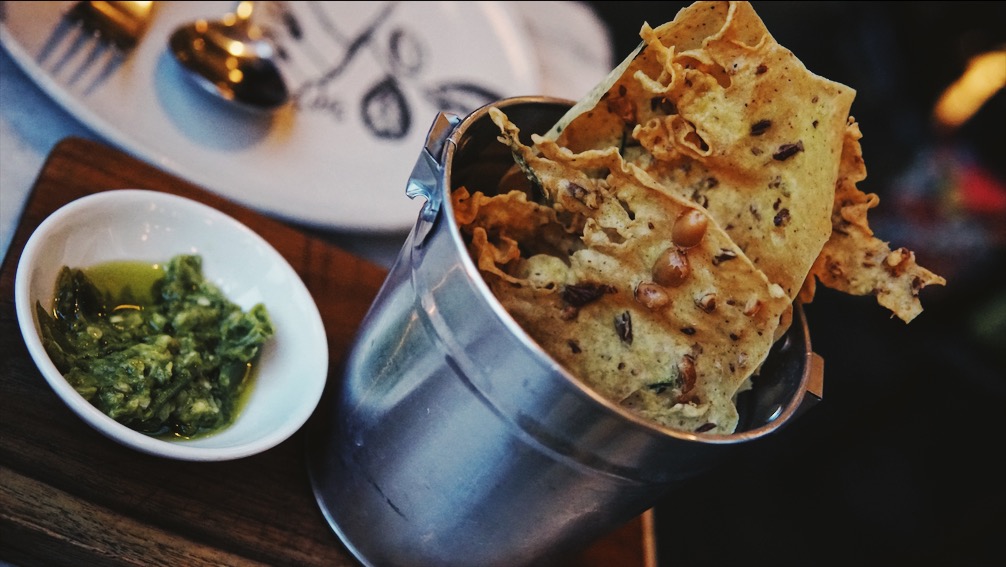
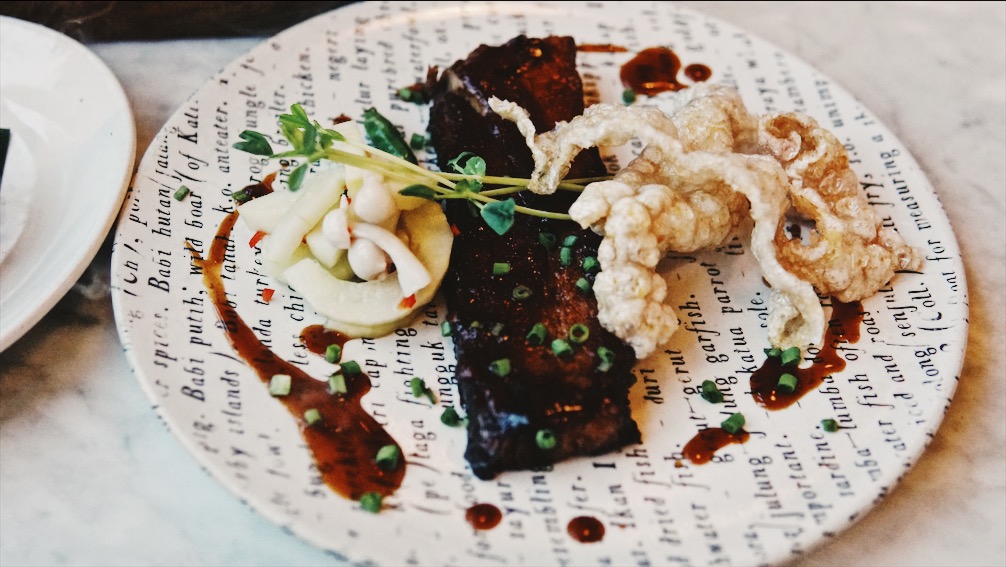
But — then came Ikan Asap Mangut (IDR193k/US$13.69) and 48 Hours Rawon (IDR215k/US$15.25) to the rescue. The tea-smoked barramundi (cooked in Hujan’s own smoker) with ginger flower simmered in coconut milk was bursting with flavor. The earthy, smoky fish, the zing of the spices, and the creamy coconut milk came together for a smooth yet complex plate.
The rawon, a dark Indonesian stew is big bowl of savory goodness that we needed on that rainy evening. It’s short beef rib with wood-roasted bone marrow, carrots, a Javanese-style boiled egg with brown sugar, and sprouts in a keluak (black nut) base. The recipe, claims Meyrick on his menu, was procured from an old ibu (lady), who was hanging on so tight to it, that he almost had to swap his car for it. Perhaps there’s a bit of hyperbole to that, but we always appreciate colorful anecdotes such as these.
We also appreciate how the broth came out in a pitcher, which got poured into our bowl, right as it was placed before us.
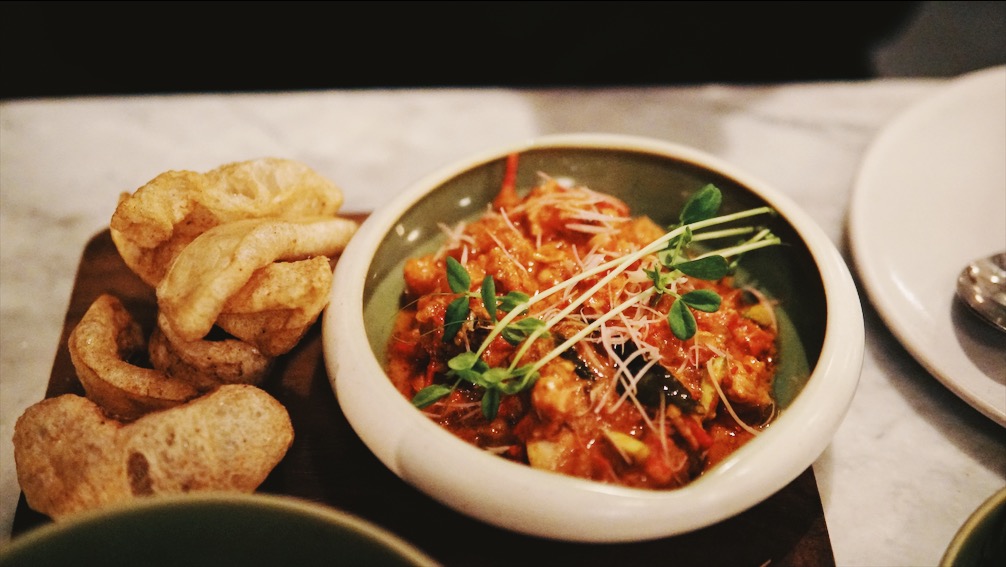
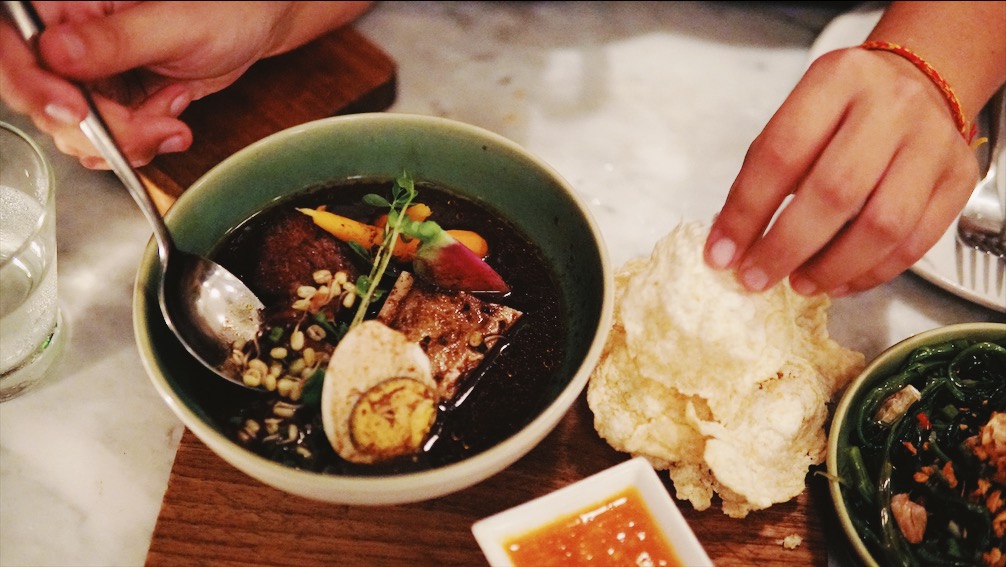
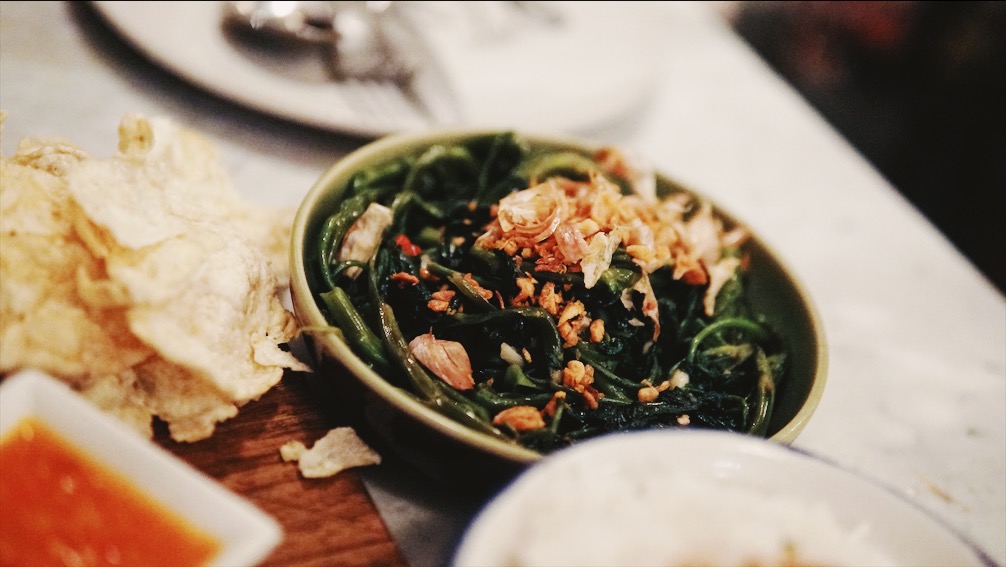
For side dishes, we tried the stir-fried kangkung with garlic (IDR50k/US$3.55). It’s hard to screw up morning glory, and Hujan Locale definitely didn’t fumble on this classic. It really seemed like the fresher tried and true kangkung you could get at any warung and sure functioned as the greens we felt we needed. A generous topping of roasted garlic certainly made us gobble it up all the faster.
We tried one dessert, the salted caramel popcorn ice cream (IDR88k/US$6.24) — not necessarily the most Indonesian dish, we know, with caramelized bananas and burned Italian meringue — but it was pretty fun, both to eat and in terms of flavor combinations.
As for drinks — well, you know we love a good cocktail. It wasn’t Night Rooster (which we’d venture to say is the gold standard for Ubud cocktails), but the drinks we sipped on were pretty darn splendid, mixing up Indonesian flavors and ingredients with classic cocktail recipes.
The Thai Basil Mule (IDR132k/US$9.36) was spicy yet sour, strong yet smooth, as a blend of bourbon whiskey, x-rated passion puree, Thai basil, tabasco, homemade pala jam, and ginger beer — a tongue twister of flavors that somehow cohesively come together.
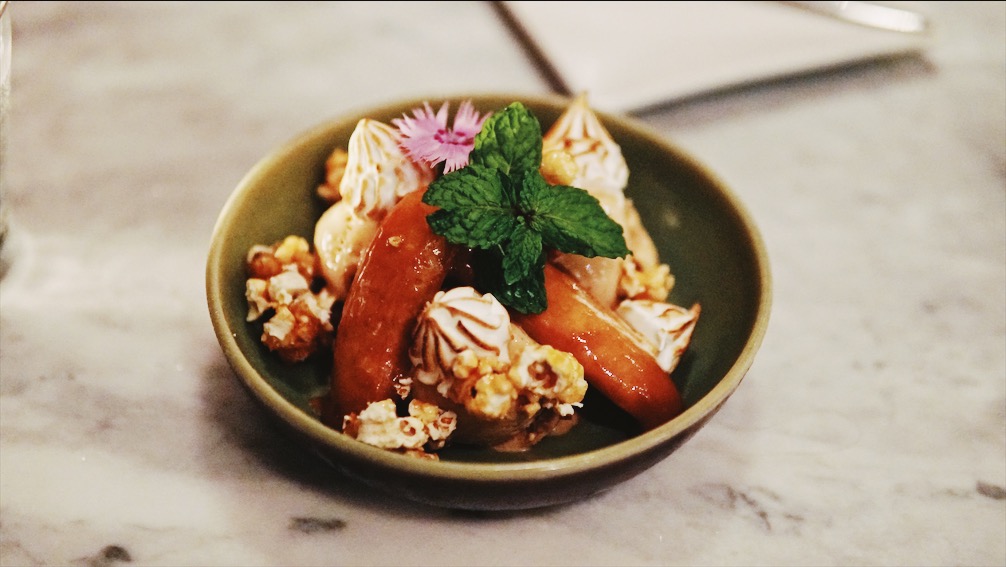

The Celery Gimlet (IDR132k/US$9.36) with gin, dry vermouth, sweet & sour apple, and celery leaves was super refreshing, and you really could simultaneously taste the apple with the celery. It almost felt healthy — just cut out the alcohol.
The Hujan Gin & Tonic (IDR160k/US$11.34), was a show-stopper — also on the refreshing side of things (Tanqueray infused Butterly pea lower and premium Indian tonic water), but also came out like a potion, on fogging, dry ice.
Bottom line: We would recommend this spot to a friend again, especially if they’re looking for Indonesian cooking made with fresh, locally and responsibly sourced ingredients in a well-designed, chill setting. BUT, unfortunately, we’d also have to say: pass on the pork belly.
FIND IT:
Hujan Locale
Jl. Sri Wedari No.5, Ubud
Lunch 11am-3pm
Dinner 5:30pm-11pm
Reservations : +62–813-3972-0306
After 6PM: +62–813-3942-3033
